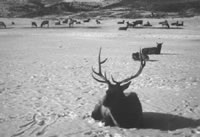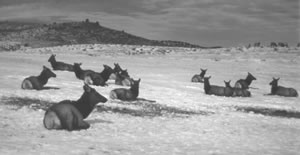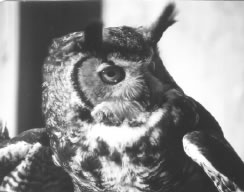|
  It
is a cold January evening, several years past. We drive through
the stillness of night, our headlights illuminating the large
hoar frost crystals that form atop the layer of snow. The
crystals sparkle like the eyes of my long-gone father when
he was in one of his trickster Irish moods. It
is a cold January evening, several years past. We drive through
the stillness of night, our headlights illuminating the large
hoar frost crystals that form atop the layer of snow. The
crystals sparkle like the eyes of my long-gone father when
he was in one of his trickster Irish moods.
We pass through thickets of gnarled Gambel’s oak, their
leafless branches like the hands of some ancient crone clawing
at the sky. Past the oaks the road rises gently and enters
a dark forest of silent pines and clown-white aspens. This
is our destination, our starting point, our entry point into
the unfamiliar, yet comforting world of night.
As we pile out of the
truck arranging hats and gloves and skis, the warmth of our
ride vaporizes like water droplets on a hot skillet. The force
of the heat dissipating into the cold night air is great enough
to upset my balance, causing me to topple over onto the snow-packed
surface. At least that is the excuse I use. I lay there momentarily
staring upwards at a sliver of sky framed by towering trees.
Most of the sky is bathed in high clouds, few stars are visible,
and the moon, full as an expecting woman, casts a bright glow
from its heavenly perch.
Minus the occasional friendly jab about “whose ideas
was this any ways,” the night is still like a pane of
glass. Though we try to keep our voices’ low, it seems
as if we are shouting. Our words ring through the aspens and
are lost in the blend of darkness and light.
 We
set off, our skis gliding over tracks we laid down several
days ago. The snow is deeper off of the road, so we slide
along the roadway, climbing higher into the night. Only the
thin layer of hoar frost seems to separate the sky from the
earth. We
set off, our skis gliding over tracks we laid down several
days ago. The snow is deeper off of the road, so we slide
along the roadway, climbing higher into the night. Only the
thin layer of hoar frost seems to separate the sky from the
earth.
From somewhere ahead of us comes sound, indistinguishable
at first, then gradually shaped by their form. The movement
of elk, several in the group by our guess, are moving parallel
to us, brushing aside limbs and small trees as if they are
but faint, summer cares. There are snorts and grunts, blasts
of air as the animals try out our scents, test who is out
there. We never see the wapiti, named by the Plains Indians
for the light-colored rumps. The name “elk” is a
misnomer, albeit argued only by zoologists, but it is the
name English colonists gave this magnificent beast, even though
it was actually a name used to describe a European moose.
Nomenclature aside, these large ruminants move through the
cover of darkness and disappear into the forest. We never
see them again, but tracks of their passage cross and line
the roadway.
 We
continue higher along the road, climb out of the ponderosa
and into ghostly forests of aspens. Able to regenerate vegetatively
by suckering, supposedly somewhere in Colorado a huge grove
of aspen grows and is considered to be the largest living
creature on the planet. These groves here on the back sides
of the La Sals don’t seem that immense; they are bisected
by numerous roads and open meadows. We expect to hear an owl
in this forest, its deep hoots barreling over the frozen ground.
But there is no sound, nothing but the twinkling of stars
far overhead. We
continue higher along the road, climb out of the ponderosa
and into ghostly forests of aspens. Able to regenerate vegetatively
by suckering, supposedly somewhere in Colorado a huge grove
of aspen grows and is considered to be the largest living
creature on the planet. These groves here on the back sides
of the La Sals don’t seem that immense; they are bisected
by numerous roads and open meadows. We expect to hear an owl
in this forest, its deep hoots barreling over the frozen ground.
But there is no sound, nothing but the twinkling of stars
far overhead.
Eventually, we turn around. The hour has gotten late and we
are tired from a long day and longer night. We aim our skis
downhill, get up some speed and feel surreal as we move through
the forest we can barely see. At the truck we unclip from
bindings and laugh and joke about the blurry downhill ride.
As we load our gear into the back of the truck we feel elated,
honored to have been a part of this night, and feel fortunate
to have shared the cold with some hungry elk going wapiti,
wapiti through the forest.
|